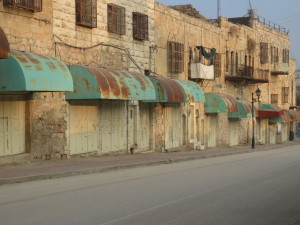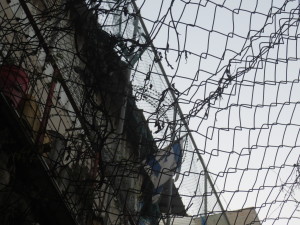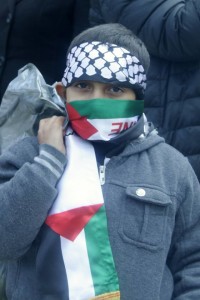Did Christ stop in Hebron?
marzo 27, 2014 in Palestina, Traduzioni da Anna Zorzi
Written by Sonia Trovato, translated by Anna Zorzi ![]()
Telling about Hebron is very difficult. You feel as if Hebron had irrevocably marked, stunned and torn you. Telling of Hebron is like telling of Apartheid, the rejection of solidarity, compassion and humanity. Telling about Hebron is telling of the hell. Yet the duty of giving testimony is stronger than the shelter of silence Egidia Beretta, Vittorio Arrigoni’s mother, has written in the book dedicated to her dead son. And in this case, the silence would be another wrong, one of the many done to those who struggle for life, dignity, identity every day in that hell, defying the wall of indifference of the international community. So what follows can only be a partial and inaccurate account, as the language, even the most precise, is not sufficient to express the absurdity, the bestiality and the total inhumanity of what you have seen.
Welcome to Hebron, the ghost town. Issa Amro, together with other representatives of the Youth Against Settlements, welcomes you with these words at Hebron 2, the historic centre under the Israeli military control after the Oslo agreements. 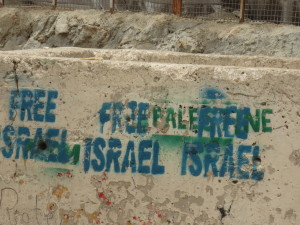 A quick look around is enough for you to realize that this will be the toughest part of your journey, that Al-Khalil( the Arabian name of the town) indelibly will be imprinted in your flesh and never leave you: graffiti on the walls say “Free Israel”, reversing this way the question of the Palestinian right to self-determination; murals in Hebrew praise what is not properly pacifism, says Issa ironically; every corner of the town is militarized; the settlers, who usually live in terraced houses on secluded hills, here live in the heart of the town. Everything seems to ask you to abandon all hope(lasciate ogni speranza voi che entrate) and to replace it with angry bewilderment. A dark-windowed car comes hurtling past you and you can hear shouts of contempt from the inside: here are the real terrorists, says Issa loudly, referring to the settlers. Some minutes later the launch of a smoke bomb – the Israeli way to welcome visitors – makes the air heavy, stifling and full of resentment. You cough, your nostrils burn, your nose starts bleeding and you start crying silent, bitter tears, which you hide behind dark sunglasses. You feel dizzy, confused and interrupt taking notes in your notebook. You remember two baby-girls coming towards you, waving their Palestinian scarves proudly as if they wanted to defy the Israeli soldiers who are observing you with arrogance. Slowly you get to the entrance of Shuhada Street, marked by a checkpoint.
A quick look around is enough for you to realize that this will be the toughest part of your journey, that Al-Khalil( the Arabian name of the town) indelibly will be imprinted in your flesh and never leave you: graffiti on the walls say “Free Israel”, reversing this way the question of the Palestinian right to self-determination; murals in Hebrew praise what is not properly pacifism, says Issa ironically; every corner of the town is militarized; the settlers, who usually live in terraced houses on secluded hills, here live in the heart of the town. Everything seems to ask you to abandon all hope(lasciate ogni speranza voi che entrate) and to replace it with angry bewilderment. A dark-windowed car comes hurtling past you and you can hear shouts of contempt from the inside: here are the real terrorists, says Issa loudly, referring to the settlers. Some minutes later the launch of a smoke bomb – the Israeli way to welcome visitors – makes the air heavy, stifling and full of resentment. You cough, your nostrils burn, your nose starts bleeding and you start crying silent, bitter tears, which you hide behind dark sunglasses. You feel dizzy, confused and interrupt taking notes in your notebook. You remember two baby-girls coming towards you, waving their Palestinian scarves proudly as if they wanted to defy the Israeli soldiers who are observing you with arrogance. Slowly you get to the entrance of Shuhada Street, marked by a checkpoint.
At this point we Arabs, who are not human beings, must leave you and say goodbye because we are not allowed to enter Shuhada Street. We will pass through the cemetery of our people and meet you farther on. With these words your Virgil takes leave of you and you feel like lost pilgrims at the entrance of the City of Dis . Dazed, you look at your passport and feel ashamed that the symbol of the Italian Republic simply proves to be a more valid pass than the blood and the roots of those who were born and brought up in that street. It’s the upside down world of the Israeli occupation, which goes beyond common sense: it’s the relatives, friends or descendants of the victims of the fanatic Jew Baruch Goldstein’s savage fury who now must pay for the wrong done to them, so as to ensure impunity to the perpetrators. Sami Huraini, the red-haired teenager you met at At-Tuwani and who has come along with you to visit a friend of his in Hebron, realizes just on that moment to belong to the group of the exiles and, confused, hurries to join the group of the Palestinians going the other way. That’s too much. You feel something break inside you, you would like to shout, cry desperately, join them, but you feel utterly paralyzed.
While walking along Shuhada street, you can only hear the sound of your desolate steps echoing the deserted place, except for the sporadic passage of an armoured bus carrying Jews. Lots of questions crowd your head, but you can’t find an answer for them because there is no answer. For example, you wonder how it can be possible to consciously choose to bring up children that way, because if it’s true that Palestinians are ghettoized and discriminated, it’s also true that the settlers lead a life full of hatred under the alibi of the promised land. These people don’t know what life is like– whispers one of you. And you would like to add they don’t even know what history is like, since, as the information boards in Jaffa showed, they boast to belong and to have the right to the “city of their ancestors”, which, according to the Zionist ideology, would have been unduly occupied by the Arab people. To bear up, you start singing bella ciao in a trembling voice and at the end of the street a group of women by the side of the road join in the singing .
 While waiting for the activists of YAS, you are invited into two small shops, where you can buy something to help the sluggish local economy and drink a cup of steaming tea made just for the occasion. When you finish shopping the shocking news comes: Mike informs you that Sami has been arrested. He has been found with no documents and so taken to the military police station under the pretext of investigations, which have the aim to intimidate and to make people understand who really rules here in Hebron. Immediately it is like being in Kafka’s The Trial. While you are waiting for news a group of kids -dirty, some of them toothless and exacerbated by hardship and the violence of the occupation – gather around you, trying to sell you bracelets, gadgets and souvenirs. Please, please, there is no business in Hebron is the endless refrain repeated by one of them, who looks the most battered, frightened and desperate and with the signs of malnutrition and the suspension of rights. A kid who speaks of business while he should be doing his homework in his cosy bedroom or playing with his friends at the park, like any other child. It’s the upside down world of the Israeli occupation, it’s the hell. You can’t refuse to buy and immediately new children arrive and biker with one another to make the best deal of their business. To appease their quarrels you distribute some shekel, coins and euro notes among them. They are immensely grateful to you: the business kid clings to your arm cheerfully when he gets a five-euro note. On the contrary, you would like to disappear instantly, because buying bracelets or souvenirs is not enough for you to remove the thought from your heart that you, unlike them, can have sweet dreams in your bed without soldiers interrupting them in the middle of the night, you can walk through your town without being investigated on your name or family tree, or, in other words, you can go out to see the stars again (a riveder le stelle).
While waiting for the activists of YAS, you are invited into two small shops, where you can buy something to help the sluggish local economy and drink a cup of steaming tea made just for the occasion. When you finish shopping the shocking news comes: Mike informs you that Sami has been arrested. He has been found with no documents and so taken to the military police station under the pretext of investigations, which have the aim to intimidate and to make people understand who really rules here in Hebron. Immediately it is like being in Kafka’s The Trial. While you are waiting for news a group of kids -dirty, some of them toothless and exacerbated by hardship and the violence of the occupation – gather around you, trying to sell you bracelets, gadgets and souvenirs. Please, please, there is no business in Hebron is the endless refrain repeated by one of them, who looks the most battered, frightened and desperate and with the signs of malnutrition and the suspension of rights. A kid who speaks of business while he should be doing his homework in his cosy bedroom or playing with his friends at the park, like any other child. It’s the upside down world of the Israeli occupation, it’s the hell. You can’t refuse to buy and immediately new children arrive and biker with one another to make the best deal of their business. To appease their quarrels you distribute some shekel, coins and euro notes among them. They are immensely grateful to you: the business kid clings to your arm cheerfully when he gets a five-euro note. On the contrary, you would like to disappear instantly, because buying bracelets or souvenirs is not enough for you to remove the thought from your heart that you, unlike them, can have sweet dreams in your bed without soldiers interrupting them in the middle of the night, you can walk through your town without being investigated on your name or family tree, or, in other words, you can go out to see the stars again (a riveder le stelle).
At last Issa and Mike manage to set Sami free from the humiliating questioning and you resume your walking together. You haven’t enjoyed the “happy ending” yet and you fall into the hell back again: a stout settler starts filming you with his mobile, sneering at you, one by one, and repeatedly inviting you to “smile”. Then you will be told that this arrogant man gets towards Mike and , once very close to him, spits at him and insults you with bad words such as rubbish deserving to die. You ignore him and go on walking through a narrow alley, which once was one of the busiest street of the town, just like Shuhada Street. Now a military order has imposed the closing down of all the shops. You look up and see a big flag with the star of David waving above your heads: another illegal settlement which breaks the international law. A net has been installed to “protect” the Palestinians from the rubbish which is thrown down by those who live up there and who play the role of an unfair, fierce god. Solid rubbish doesn’t pass through the net, but liquid wastes do such as dirty water, hot cooking oil and body fluids, which should be dumped somewhere else but which hurt the skin and the dignity of those who passes by here every day. You are advised to keep very close to the wall while walking along it. You are utterly shocked, you feel you are going to faint and you cling to Vittorio’s motto stay human so as not to fall down. Issa seems he can read your mind and in his provocative and peremptory tone, which has marked this shocking, hell-like afternoon, tells you that in Hebron staying human is not enough, you have to stay actively human, you have to do your best to assert the feelings of humanity and justice. Stay actively human.
You have not even time to recover from Issa’s suggestive words and a violent tremor shakes the ground. The tremor smells like gunpowder and brings about the cries of children who, for self-defence or an impulse to fight back, cry and throw stones. It’s the tremor of a shower of smoke –bombs thrown by the settlers at you, defenceless civilians, perhaps to take revenge of you being there. These bombs will kill an eighty-year-old Palestinian who was going out perhaps to do the shopping, who knows, and who surely didn’t imagine dying defenceless on the roadside. You start rushing away as fast as you can, your heart pounding and prostrate with fright, terror and indignation. You have been told that Massimo Bray, the Minister of Culture of Letta’s government, during his recent visit in Hebron, was escorted by the settlers and turned a blind eye to the Palestinians’ suffering. It’s him and those like him you are thinking about while you are running to the Pullman, trying to control your violent feelings which come from the memory of the disgusting and hypocritical whining at Mandela’s funerals. Everybody here and there to remember him with honeyed words, and describe him as a dear old pacifist man. But what about the partisan Mandela? What about Mandela and his sensitive involvement with the situation in the West Bank, who said our freedom will be always incomplete until Palestinians will be free? 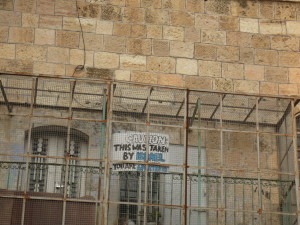 What about Mandela’s campaign for the liberation of Marwan Barghouti and all Palestinian political prisoners, while he himself was imprisoned in his old cell on Robben Island? He has been cancelled from History, concealed, hidden in an old wardrobe, because no words must be said on Apartheid in Palestine. It’s better for all to speak of the Apartheid in South Africa, which is gone for good and doesn’t threaten the advantageous diplomatic relations which are necessary for Western democracies to have an outpost in the Middle East. So, while you are running away from the smoke-bombs, you think to yourself that Christ didn’t stop in Hebron, he can’t have stopped here. He must have been stopped at a checkpoint somewhere in a settlement or another, because if he had seen the racism, usurpation and poverty in this corner of the earth, then he wouldn’t have allowed the world to turn a blind eye and to live in peace.
What about Mandela’s campaign for the liberation of Marwan Barghouti and all Palestinian political prisoners, while he himself was imprisoned in his old cell on Robben Island? He has been cancelled from History, concealed, hidden in an old wardrobe, because no words must be said on Apartheid in Palestine. It’s better for all to speak of the Apartheid in South Africa, which is gone for good and doesn’t threaten the advantageous diplomatic relations which are necessary for Western democracies to have an outpost in the Middle East. So, while you are running away from the smoke-bombs, you think to yourself that Christ didn’t stop in Hebron, he can’t have stopped here. He must have been stopped at a checkpoint somewhere in a settlement or another, because if he had seen the racism, usurpation and poverty in this corner of the earth, then he wouldn’t have allowed the world to turn a blind eye and to live in peace.
The minibus starts again and stops a few kilometres farther on in front of the glass and ceramic factory, another important business of the local economy which the occupation is going to sweep away. And once here you burst out in an uncontrollable fit of crying , which almost takes your breath away. You can’t stop sobbing, Luisa hugs you and Mike takes care of you. While all the others rush out of the Pullman to buy cups and saucers, all the Palestinians there, included the glass-worker who abandons his counter, gather around you. You would like to explain them what you feel, but you can’t articulate words, only convulsive sobs. We are very strong people and we resist! Says Mike with great emphasis and a wide, loving smile. This sentence is imprinted in your mind and you still remember the tone and gestures which pronounced it, even after three months. They offer you some tea, you try to take a sip of it and, once you have recovered yourself, you explain them how powerless you feel and how difficult it will be for you to come back to you normal life, after you have seen the daily harassment the Palestinians in Hebron are subjected to. At this point a slim young boy gets to you and shows you a scar on his stomach, the legacy of a violent beating by the settlers. A man in his fifties tells the story of one of the many nights spent in the freezing cold while the soldiers breaks into his house, made a mess of his belongings and dirtied his place with curses and insolence.
During one of these countless night his newly-born child suffered an injury to the eardrum because of the long exposure in the pouring rain and the freezing cold which made him irretrievably deaf. You would like to stop them, their testimonies make you feel dizzy and it seems odd to you to comfort somebody by burdening them with further suffering. But then, after feeling ashamed of having such a thought, you understand. You realize that what they ask you is to take Hebron out of Hebron, to give them voice, not to let them die in silence. On the coach, while tears are still running down your cheeks, you get the best present in your life: a key ring from Palestine, which the boy with a scar gives you, telling you in Italian that you are nice and good.
At night the ghosts of Hebron keep haunting you. You neither can share the enthusiasm for the arrival of the two young actors of the Freedom Theatre or think you can spend a relaxed evening. You can’t pretend not to smell the smell of sulphur or to have just been to the città dolente (suffering city), nell’etterno dolore(in the eternal pain), tra la perduta gente (among the abandoned people). You know that an agitated night is waiting for you, crowded with sospiri,p ianti e alti guai (sighs, lamentations and loud cries). You know you are going to spend a night full of nightmares, sudden jerks, children’s emaciated and begging faces, faces you will never forget and which have become a warning to you not to slip into the sloth, to stay human, to hate the indifferent.
To get an idea of the horrors in Hebron watch the documentaryhttp://www.youtube.com/watch?v=A5kfE5uDEBY

